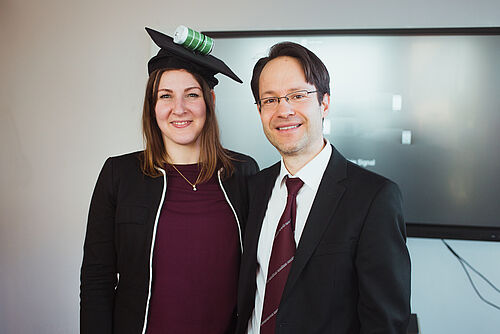On January 18, 2024, Fabienne Lambusch, doctoral student at the Chair of Information Systems, successfully defended her doctoral thesis. The topic of the thesis was "IT-supported Occupational Self-Management to promote Sustainable Productivity and Psychological Well-Being". The reviewers were Prof. Michael Fellmann, Prof. Christian Märtin (TH Augsburg) and Prof. Kurt Sandkuhl. The result of the defense was the recommendation to the university to award the doctoral degree "Dr.-Ing".
Abstract
Technological advances in recent decades and the shift to knowledge-intense work offer individuals wide personal and professional freedom regarding time, space, and task definition. At the same time, large self-responsibility and flexibility in modern work life can lead to high working pressure and requires the workforce to manage themselves effectively. Overtaxing workers’ self-management competencies can result in work behaviors through which they actively risk their health. Thus, supporting individuals’ self-management steadily grows in importance, especially to promote sustainable productivity and psychological well-being in this area of tension. The complexity of self-management behaviors and the reference to highly individual situations leave a need for personalized but scalable approaches to support. Digital solutions can be an effective means for the integration of assistance into everyday life. The increasing use of various mobile devices and unobtrusive sensors enables new kinds of individual tracking and personalized feedback. However, there is a lack of research addressing digital assistance for self-management regarding the challenges of modern work life. This dissertation fills this gap and investigates how technology can especially contribute to self-manage sustainable productivity and psychological well-being. It provides an overview on the design space relevant for the construction of such systems assisting the workforce in their occupational self-management and showcases application areas. A series of contributions investigates various important aspects in engineering occupational self-management systems. The complex subject matter with its interdisciplinary nature spanning research traditions of several disciplines led to a large variety of methods used. An architecture is presented that conceptualizes a context-aware system integrating several data sources, analyses, and feedback options along with descriptions of implementation options of such a system in form of a technical infrastructure. Furthermore, human energy is presented as a key variable in occupational self-management regarding the challenges the workforce faces in these times. In this direction, especially the support in human energy self-management as prototypical instance of possible self-management assistance systems is investigated. An evaluation of the energy self-management approach has shown a positive effect of the technological assistance on the individual. Future research could deepen the understanding in this direction.


